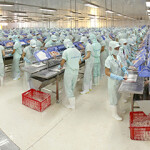Nigeria revives plan to grow its EU, US seafood export market share

Nigeria is working to increase both the quality and quantity of its seafood exports, especially those destined for E.U. and U.S. markets, where sales of some of the African country’s fish products are currently restricted.
To accomplish this, Nigeria – Africa’s most-populous country, with over 220 million people – is planning to boost its domestic fish production by reviving and revamping the country’s One-State-One-Product (OSOP) program.
The OSOP program is modeled on Japan’s One Village One Product initiative, which was launched in 1980. It aims to empower local governments by adopting one non-oil product in each of the country’s 36 states that would then undergo enhanced development down its value chain. The program is designed to entice foreign importers to invest in diversifying the country's economy, thereby reducing its economic dependency on oil exports. The program also hopes to enhance competitiveness and foster socioeconomic inclusion by supporting artisanal production.
Nigeria has identified fisheries and seafood products in the states of Adama, Akwa Ibom, Bayelsa, and Lagos as ideal for the OSOP program.
“[The program] is carefully selected to prepare the exporters of seafood to take advantage of the increasing demand and market share for [their products within] the international market,” Nigeria Export Promotion Council (NEPC) Director-General Ezra Yakusak said.
The NEPC, which is a federal government agency with the responsibility of promoting non-oil exports in Nigeria, hopes that through the OSOP program, the country can improve the quality of its seafood production and overcome plongstanding hurdles to aquaculture development such as a lack of financing, high input costs, and low quality of fish seed.
In partnership with the Nigerian Federal Department of Fisheries, NEPC has been training fish farmers, processors, marketers, and exporters on how to address concerns raised by food safety authorities in the U.S. and the E.U., with the goal of producing seafood that meets their standards.
In 2018, the U.S. Food Safety and Inspection Service (FSIS) suspended imports of catfish and other fish products from Nigeria after the West African country’s fisheries department failed to fully supply information requested in the FSIS self-reporting tool prior to its due date. The tool is used to obtain information from foreign countries demonstrating their documented food safety inspection systems achieve a level of public health protection equivalent to the FSIS inspection system’s standards.
“Consequently, Nigerian catfish farmers and processors lost the market opportunity for smoked and packaged catfish,” the FSIS stated at the time.
NEPC has been working closely with seafood value chain players to address the issues raised by the FSIS on catfish exports to the U.S., as well as ...
Photo courtesy of the Nigerian Export Promotion Council





Share